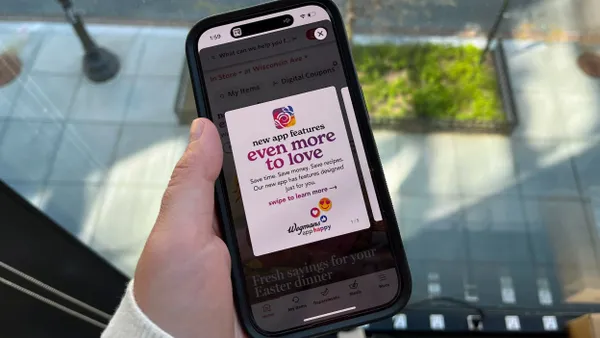Dive Brief:
- The majority of employees would welcome a bring-your-own-device policy in the workplace according to a new study from Work Jam. The study polled more than 1,000 hourly employees and employers throughout different industries to gauge their response to using their own mobile devices for work purposes.
- Two-thirds of survey respondents thought the idea would make a positive difference in their work life, allowing them to more easily find shifts that match their schedules.
- Millennials are the most receptive to the idea, with 57% preferring to use their cell phones to look up work-related information like schedules and training documents.
Dive Insight:
Roughly 77% of Americans own a smartphone according to research from the Pew Research Center, making it no surprise that most workers would prefer to tap into work-related systems and information from their mobile device as opposed to a central computer or desktop system at work.
The benefits surrounding such policies are largely related to ease of communication and efficiency.
“It’s never been more imperative that employers put the power of communication and scheduling into employees’ hands,” said WorkJam CEO, co-founder and president Steven Kramer in a press release regarding the research. “Having access to a central repository of training information that can be updated instantaneously will enable employers to retrieve information on their own time, from anywhere. Additionally, there is no longer confusion when policies change. Entire departments are alerted immediately when there’s a change in operations.”
If work systems are made accessible on employees’ personal phones, contacting a manager or accessing work-related files becomes much more streamlined regardless of whether the worker is at home or on the job. Proponents also say it enhances workplace culture because it gives workers greater control, enhances morale and reduces turnover rates.
As the unemployment rate hovers around 4% and the number of jobs available in the retail industry is on the rise, food retailers have been doing everything they can to keep a tight hold on their employees including innovative training methods and smoothing out bumps in communication and scheduling — which can be done through the use of mobile devices.
Walmart adopted a bring-your-own-device policy in October 2018, encouraging employees to use the devices to check inventory, item prices, clock in, scan products, and review sales data, according to Business Insider. Participating employees can download the Walmart app, which prevents Walmart from having access to the user’s personal data on their phone.
But there are some potential downsides to encouraging workers to merge their personal phones with their work-related responsibilities. Numerous studies have explored whether smartphones are a threat to productivity at work. Endless alerts including texts, emails, and other notifications often disrupt concentration, with 83% of millennials opening a text message within 90 seconds of receiving the notification according to OpenMarket research.
These statistics have largely been the basis for bans on smartphone use at work and don’t bode well for employers who want their workers to use their smartphones for work reasons only while on the clock.
There are also certain privacy and legal concerns with blurring the line between personal and work use for smartphones. For hourly employees, time spent accessing work-related materials outside of their shifts could violate certain wage and hour laws. There's also the issue of workers who can't afford smartphones or who have a limited data plan that they may not want to spend on work-related tasks.












